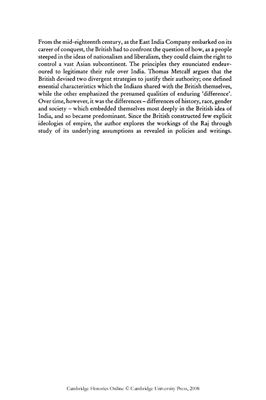Cambridge University Press, 1995. - 224 pp.
The original Cambridge History of India published between 1922 and 1937 did much to formulate a chronology for Indian history and describe the administrative structures of govement in India. The New Cambridge History of India series, to which Thomas R. Metcalf's book belongs, is designed to take full account of recent scholarship and changing conceptions of South Asia's historical development. Ideologies of the Raj examines the ways in which the British sought to justify and thus legitimate their rule over India. Thomas Metcalf demonstrates eloquently that the British devised two divergent strategies to justify their authority: one defined essential characteristics which the Indians shared with the British themselves, while the other emphasized the presumed qualities of enduring 'difference'. Overtime, however, it was the differences - differences of history, race, gender and society -which embedded themselves most deeply in the British idea of India, and so became predominant. Since the British constructed few explicit ideologies of empire, the author explores the workings of the Raj through a study of its underlying assumptions as revealed in policies and writings. This timely book fills an enormous gap in scholarship as the author, drawing from his own research as well as from the writings of younger scholars in India and elsewhere, provides us with a synthetic view of the ideologies of the Raj during the years of uncontested British supremacy from 1858 to 1918.In short this is an excellent book, well argued and well written that will be useful for students and to the educated reader.
The original Cambridge History of India published between 1922 and 1937 did much to formulate a chronology for Indian history and describe the administrative structures of govement in India. The New Cambridge History of India series, to which Thomas R. Metcalf's book belongs, is designed to take full account of recent scholarship and changing conceptions of South Asia's historical development. Ideologies of the Raj examines the ways in which the British sought to justify and thus legitimate their rule over India. Thomas Metcalf demonstrates eloquently that the British devised two divergent strategies to justify their authority: one defined essential characteristics which the Indians shared with the British themselves, while the other emphasized the presumed qualities of enduring 'difference'. Overtime, however, it was the differences - differences of history, race, gender and society -which embedded themselves most deeply in the British idea of India, and so became predominant. Since the British constructed few explicit ideologies of empire, the author explores the workings of the Raj through a study of its underlying assumptions as revealed in policies and writings. This timely book fills an enormous gap in scholarship as the author, drawing from his own research as well as from the writings of younger scholars in India and elsewhere, provides us with a synthetic view of the ideologies of the Raj during the years of uncontested British supremacy from 1858 to 1918.In short this is an excellent book, well argued and well written that will be useful for students and to the educated reader.

